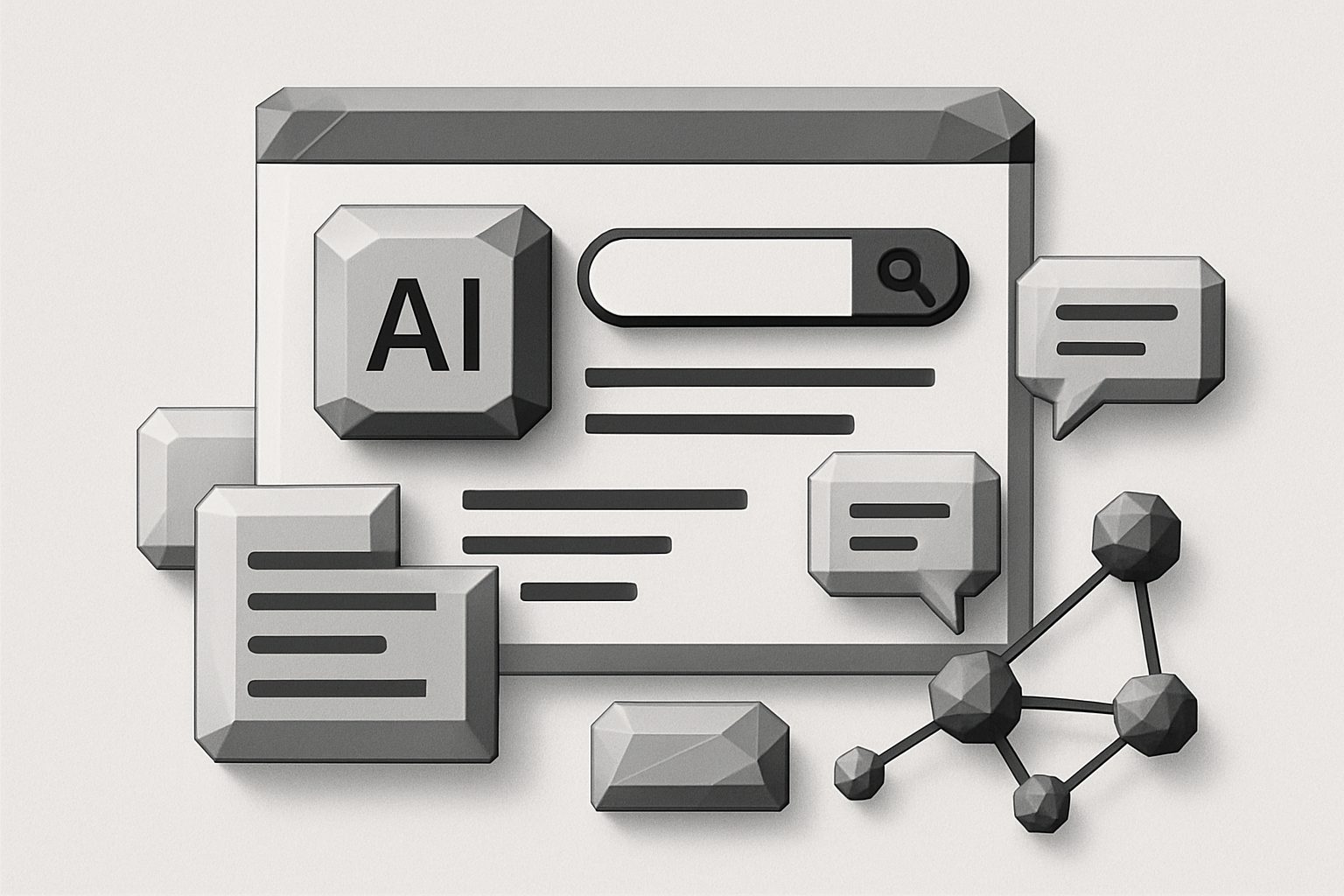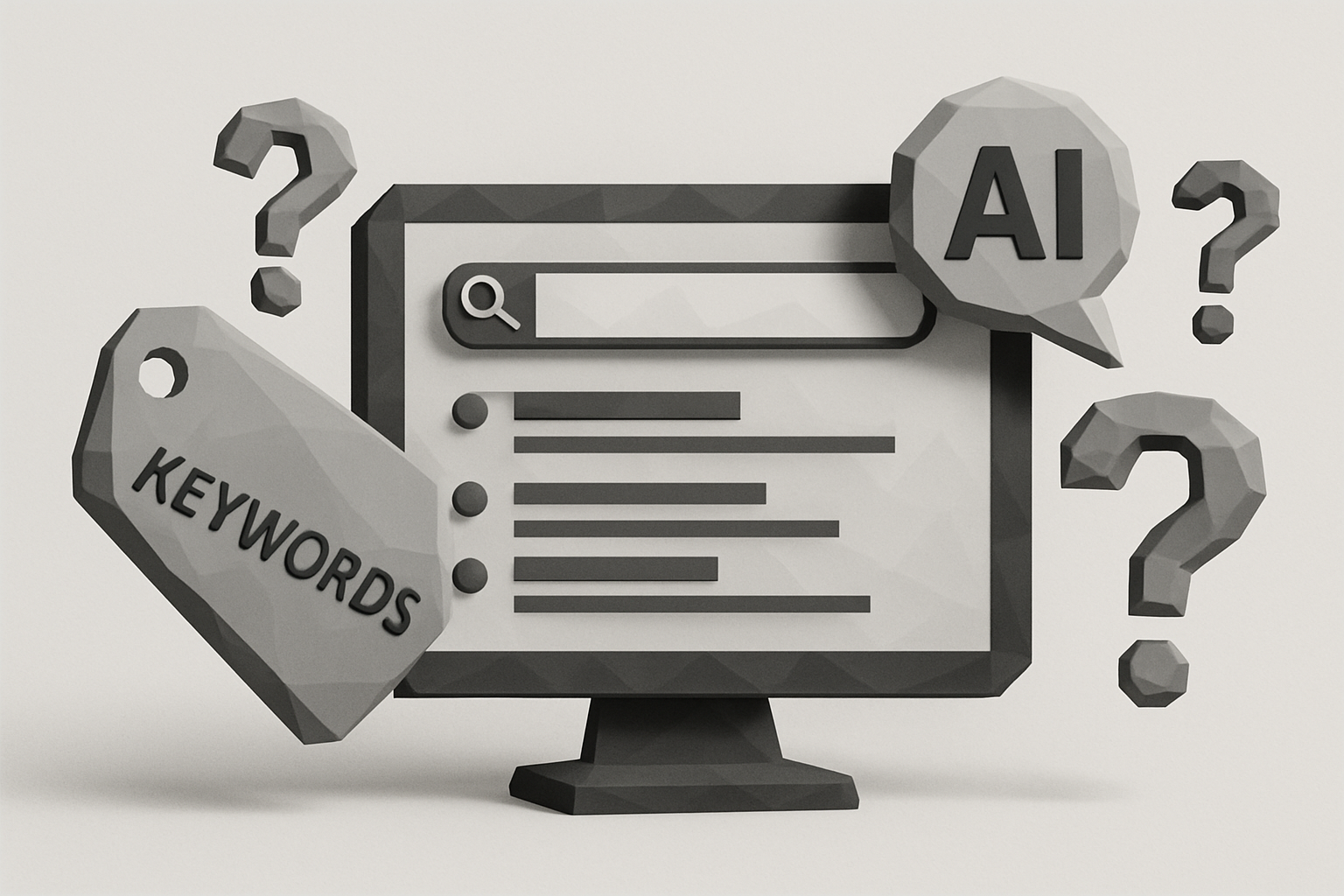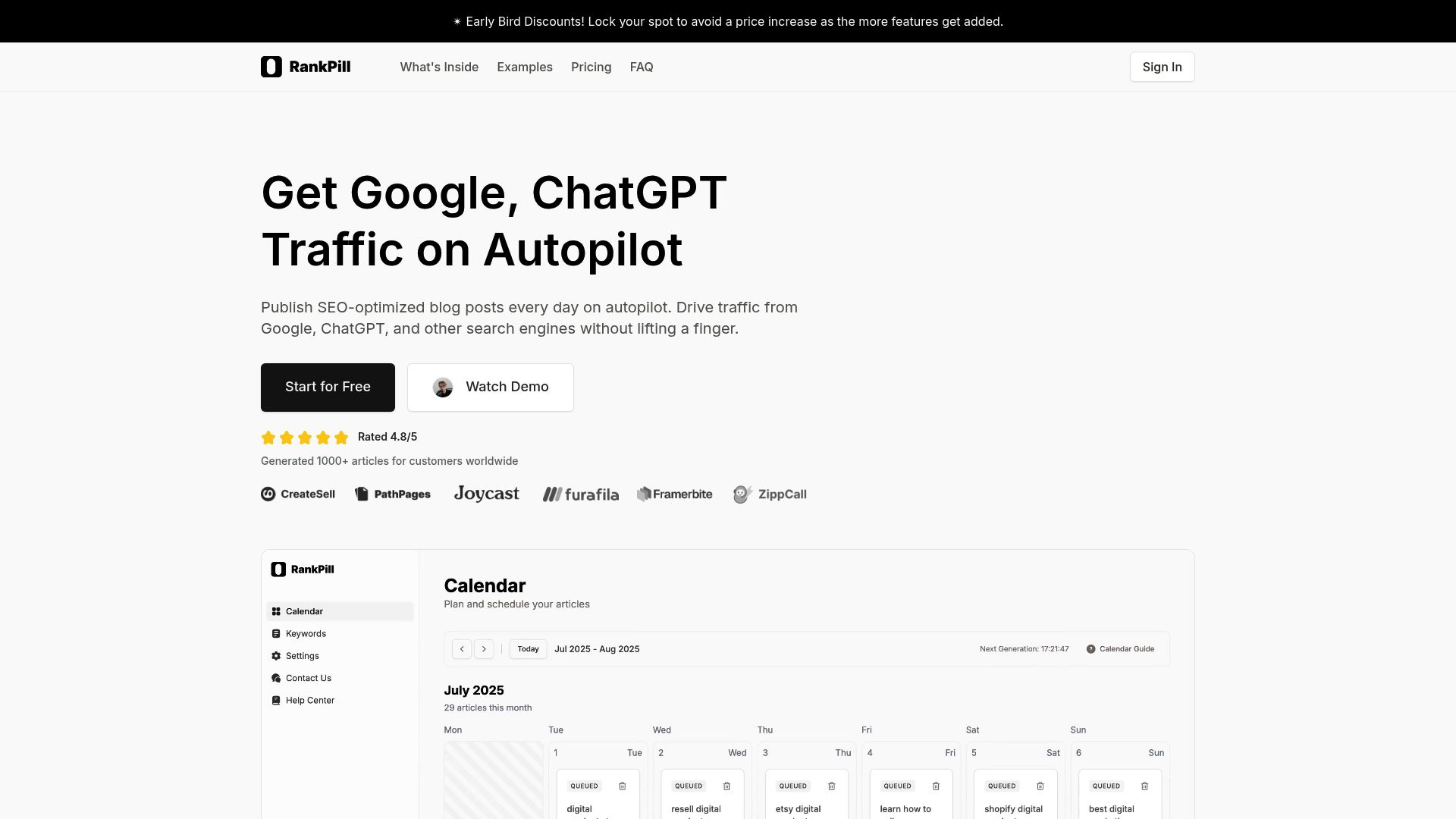Artificial intelligence is transforming how people find information online. The pace of change is accelerating, with AI now at the heart of search engines and digital assistants. In 2025, traditional SEO tactics are no longer enough to stand out.
AI-powered systems understand context, intent, and deliver answers directly to users. To stay visible, businesses and marketers must adapt and optimize for ai seo with smarter, more flexible strategies.
This guide is your roadmap to future-proofing your digital presence. You’ll discover how to optimize for ai seo, from understanding new search algorithms to creating content that earns AI citations.
We’ll cover everything you need: how AI is reshaping search, adapting keywords and content, leveraging automation, technical SEO, and measuring results in an AI-first world.
Understanding AI SEO in 2025
Artificial intelligence is rapidly reshaping the search landscape. In 2025, AI-driven algorithms are at the core of how users discover information and brands online. To stay visible, businesses must understand how to optimize for ai seo as search engines and assistants grow smarter and more context-aware.

The Rise of AI in Search Engines and Assistants
AI is now embedded in every major search engine, from Google’s MUM and SGE to Bing’s integration with ChatGPT. These systems interpret not just keywords, but user intent and context, delivering more relevant answers.
For example:
- Google’s AI generates rich, direct answers in featured snippets.
- AI assistants like Gemini and ChatGPT guide users through conversational queries.
- Over 60% of online experiences now begin with AI-augmented search (Forbes).
This evolution means brands must optimize for ai seo by aligning content with how AI systems process language and intent.
Key Differences Between Traditional SEO and AI SEO
Traditional SEO focused on keyword density, backlinks, and meta tags. AI SEO is more nuanced, emphasizing semantic understanding, topic modeling, and user intent. Today, structured data and content quality signals are crucial.
AI evaluates expertise, authority, and trust (E-E-A-T), rewarding sites that demonstrate credibility and relevance. Unlike classic blue links, AI often surfaces direct answers or summaries.
To succeed, you need to optimize for ai seo by mastering these new signals. For a deeper dive, see AI SEO strategies explained.
The Impact of Generative AI on Content Discovery
Generative AI now powers summaries and direct answers in search results. Instead of scrolling through links, users increasingly get instant responses from AI models.
Key shifts:
- Being cited as a trusted source by AI is vital.
- User journeys are moving from search engines to conversational assistants.
- ChatGPT and similar tools often reference brand content directly.
- 40% of Gen Z prefers AI chatbots over traditional search engines (Forbes).
To optimize for ai seo, ensure your content is authoritative and easily referenced by generative AI.
Challenges and Opportunities in AI-Driven SEO
AI-driven SEO introduces both hurdles and openings. Competition for “position zero” and AI citations has intensified. Tracking AI-generated traffic is more complex, demanding new analytics approaches.
Yet, brands that adapt can become go-to sources for AI systems. Agility and continuous learning are essential. Experts predict that as you optimize for ai seo, this discipline will become the main focus for digital marketers in 2025.
Embracing these shifts now positions your brand for future success.
Adapting Keyword Research and Content Strategy for AI SEO
Adapting how you research keywords and create content is essential if you want to optimize for ai seo in 2025. AI isn’t just changing the rules—it’s rewriting the playbook. Here’s how to evolve your approach to stay visible and relevant.

Intent-Driven Keyword Research: Moving Beyond Exact Match
To optimize for ai seo, focus on understanding what users actually want, not just matching exact keywords. AI interprets search intent, analyzing context and meaning behind queries.
Modern tools help you find intent-rich queries by clustering related topics and semantic keywords. For instance, instead of only targeting “leaky faucet repair,” you’ll also address “how to fix a leaky faucet” and related questions.
- Use topic clusters to group content by theme.
- Analyze user intent with AI-powered platforms.
- Research semantic variations to capture broader traffic.
According to recent data, AI-powered tools boost relevant keyword targeting by 30%. For a deeper dive into this approach, check out these AI-powered keyword research tips.
Framing Content to Answer Specific Questions
Question-based content is now critical if you want to optimize for ai seo. AI-powered search engines and assistants reward direct, well-structured answers to user questions.
Structure your articles to address “how,” “what,” and “why” queries. Incorporate FAQs and conversational sections to increase your chances of being featured in AI-generated snippets.
- Add answer boxes for common questions.
- Include conversational language for natural engagement.
- Use clear headings to highlight answers.
Did you know that 70% of voice searches are question-based? Winning these queries helps your content surface in both traditional and AI-powered results.
Building Topical Authority and Trust Signals
Establishing authority is key if you aim to optimize for ai seo. AI models reward content that is well-cited, trustworthy, and referenced by credible sources.
Boost your topical authority by:
- Earning citations from respected sites and platforms.
- Including expert quotes or original research in your articles.
- Encouraging user-generated content and reviews.
When your brand is cited in ChatGPT or Google SGE responses, it signals trust to AI. In fact, pages with strong trust signals receive twice as many AI citations, making authority a powerful ranking factor.
Content Depth, Structure, and Semantic Optimization
AI prefers content that is both comprehensive and easy to interpret. If you want to optimize for ai seo, create in-depth guides using structured formats and semantic optimization.
Use schema markup and clear headings to enhance AI readability. Entity-based optimization and pillar pages also help cover topics thoroughly.
| Optimization Tactic | Benefit |
|---|---|
| Schema markup | Richer search features, better parsing |
| Pillar pages | Comprehensive coverage, higher relevance |
| NLP analysis tools | Semantic completeness, topic depth |
Long-form, well-structured content consistently ranks higher in AI-driven SERPs, so invest in depth and clarity.
Leveraging Automated Content Tools for Scale
Scaling up without losing quality is crucial as you optimize for ai seo. AI-powered content platforms can help you generate outlines, drafts, and even optimize posts in real time.
Balance automation with human oversight to maintain E-E-A-T (Experience, Expertise, Authoritativeness, Trustworthiness). Use AI for efficiency, but always review and refine content for accuracy and tone.
- Automate topic ideation and drafts.
- Use AI for SEO optimization suggestions.
- Ensure editorial review before publishing.
With automated tools, content creation time is slashed by 50%, letting you focus on strategy and creativity while maintaining high standards.
Leveraging AI-Powered SEO Tools and Automation
AI is transforming the way we optimize for ai seo. With rapid advancements in machine learning and automation, businesses can streamline their SEO workflows, uncover deeper insights, and gain a competitive edge. Let’s explore how AI-powered tools are reshaping every stage of the SEO process, from competitor analysis to fully automated content engines.
The Role of AI in Competitor and SERP Analysis
To optimize for ai seo, you need to see the full playing field. AI-powered tools can scan SERPs, competitors, and trending topics in real time, surfacing critical changes faster than manual tracking. They alert you to new featured snippets, People Also Ask results, or shifts in ranking factors.
For a deeper dive into the top platforms that make this possible, check out this Best AI SEO tools overview. These solutions help you pivot strategies quickly, ensuring you don’t miss out on valuable opportunities or sudden algorithm updates.
Automating Content Planning and Scheduling
AI streamlines content ideation and scheduling, making it easier to optimize for ai seo. By analyzing search trends, gaps, and competitor strategies, AI suggests high-potential topics tailored to your audience.
Once you have a list of ideas, AI tools can build a content calendar and automate publishing, ensuring your output is consistent. This automation frees up your team’s time, allowing you to focus on creativity and quality rather than repetitive tasks.
AI-Driven Content Optimization and Personalization
Personalized content is now essential if you want to optimize for ai seo. AI-powered platforms evaluate your content in real time, scoring it for SEO, readability, and relevance to user intent.
They suggest improvements for meta tags, internal links, and even adjust content for different user segments or search intents. The result is content that not only ranks but also resonates with your audience, leading to higher engagement and conversions.
Integrating Visual and Video Content with AI
Modern AI tools help you optimize for ai seo by automatically adding relevant images, graphics, and videos to your pages. These platforms can summarize videos, select the best visuals, and embed them where they’ll have the most impact.
Pages enhanced with multimedia consistently outperform text-only content in AI-driven search results. Leveraging these features helps your site capture attention, boost dwell time, and improve your chances of earning featured placements.
How RankPill Automates AI SEO for Businesses
RankPill is an all-in-one platform designed to optimize for ai seo without the complexity. It automates keyword research, competitor tracking, daily content creation, and on-page optimization.

Core features include internal and external linking, multimedia integration, and multi-language support. With RankPill, businesses save over 20 hours a week and achieve agency-level results—no SEO expertise required. This level of automation empowers you to stay ahead in the evolving world of AI search.
Technical SEO for AI-Driven Search Engines
Staying visible in 2025 means you need to optimize for ai seo at a technical level. AI-driven search engines evaluate your site’s structure, markup, speed, and security far beyond what traditional algorithms did. Here’s how to adapt your technical SEO for the AI era.

Structured Data and Schema Markup for AI Readability
To optimize for ai seo, structured data is now essential. AI models depend on clear schema markup to understand your content and surface it in rich results.
Key schema types for AI:
| Schema Type | Use Case | Impact |
|---|---|---|
| FAQ | Answer boxes | Featured snippets |
| Review | Product/service trust | Higher CTR |
| HowTo | Step-by-step guides | Voice/visual answers |
Marking up FAQs, reviews, and products helps AI generate accurate summaries. According to data, pages with schema markup see a 30% boost in click-through rates. For a deeper dive, check out Optimizing for AI search engines to get practical tips on implementing schema.
Site Architecture, Crawlability, and Indexing
A logical, flat site structure is critical if you want to optimize for ai seo. AI crawlers rely on streamlined navigation and internal links to map your content quickly.
Best practices include:
- Organize content in a flat hierarchy.
- Use descriptive anchor text for internal links.
- Ensure all pages are accessible via a sitemap and not blocked in
robots.txt.
Example robots.txt:
User-agent: *
Allow: /
Sitemap: https://yourdomain.com/sitemap.xml
Well-structured sites are indexed up to 40% faster, giving you a valuable edge.
Page Experience, Core Web Vitals, and Mobile Optimization
To optimize for ai seo, page experience signals are more important than ever. AI-driven search engines measure speed, responsiveness, and interactivity using Core Web Vitals.
Focus on:
- Fast load times (Largest Contentful Paint)
- Responsive design for all devices
- Interactive elements (First Input Delay)
- Mobile-first layouts for voice and touch
Remember, 70% of AI-driven searches happen on mobile. Prioritize mobile optimization to capture more traffic and improve rankings.
Security, Privacy, and Compliance Signals
AI models also factor in your site’s security and compliance. To optimize for ai seo, always use HTTPS and display privacy policies clearly.
Checklist for trust signals:
- HTTPS across all pages
- Visible privacy policy and terms
- Compliance badges (e.g., GDPR, CCPA)
- Secure checkout for e-commerce
80% of users trust sites with visible security signals, and AI rewards these trustworthy sites with higher rankings. Make security and compliance a non-negotiable part of your technical SEO.
Measuring and Improving AI SEO Performance
Keeping up with performance metrics is crucial if you want to optimize for ai seo in 2025. As AI reshapes how users find and interact with content, traditional measurement methods are evolving. Let’s break down the best ways to track, analyze, and refine your AI SEO efforts for maximum impact.
Tracking AI-Driven Traffic and Visibility
AI-driven assistants and Search Generative Experiences (SGE) introduce new challenges in tracking traffic. Many visits now come from conversational AI, not just classic search engines. To optimize for ai seo, use advanced analytics tools that can monitor non-traditional sources, such as citations from ChatGPT or Bing Copilot.
Here’s a quick comparison of traffic sources in 2025:
| Traffic Source | Tracking Method |
|---|---|
| AI Assistants | Custom UTM parameters, logs |
| SGE Results | Citation monitoring tools |
| Organic Search | Standard analytics |
According to How AI is reshaping SEO, AI-driven traffic is projected to account for up to 25% of site visits this year. Make sure you’re capturing this data for accurate performance insights.
Monitoring Rankings in AI-Powered SERPs
Ranking in AI-powered SERPs is about more than just position—it’s about being the cited answer. To optimize for ai seo, track featured snippets, position zero, and direct citations in AI-generated summaries.
Use tools that monitor:
- Brand mentions in AI answers
- Shifts in featured snippets
- Visibility in People Also Ask boxes
Remember, a featured snippet ranking can drive 30% more organic clicks. Regularly review your SERP presence, and adjust your content to increase the chances of being cited by AI models.
Analyzing User Engagement and Behavioral Signals
AI rewards content that keeps users engaged. When you optimize for ai seo, focus on metrics like dwell time, scroll depth, and interaction rates. High engagement signals tell AI models your content is relevant and valuable.
Consider using heatmaps, session recordings, and behavior analytics to spot trends. Pages with strong engagement see up to 2x more AI-driven referrals. Here are key signals to track:
- Time on page
- Bounce rate
- Scroll depth
Improving these metrics can help your pages stand out in AI-powered search results.
Continuous Learning and Iteration with AI Insights
The best way to optimize for ai seo is to treat it as an ongoing process. AI analytics let you adapt rapidly—analyze what’s working, A/B test content, and iterate based on results. Use AI-powered insights to refine your strategies and stay ahead of competitors.
A/B testing titles, layouts, and calls-to-action can dramatically impact your SEO ROI. According to AI SEO Strategies 2025, marketers who continuously update their strategies see up to 40% better returns.
Stay agile, embrace data, and make continuous improvement part of your AI SEO playbook.
Future-Proofing Your AI SEO Strategy
Adapting to the future of search means businesses must optimize for ai seo continuously, not just once. The pace of change in AI search algorithms and user behavior is only increasing. Embracing agility and proactive learning is essential to outpace competitors and maintain visibility.
Staying Ahead of Algorithm and AI Model Updates
To optimize for ai seo, you need to stay alert to frequent changes in AI-driven search. Algorithm updates like Google's SGE or evolving AI models can shift the rules overnight.
How can you keep pace?
- Follow industry news and official search engine announcements.
- Test your site after major updates for ranking or visibility shifts.
- Adjust strategies quickly based on real-world data.
According to AI's Impact on Search in 2025, 80% of marketers now update their SEO strategies at least quarterly. Agile teams that monitor trends and adapt rapidly are best positioned for long-term success.
Building Brand Authority and E-E-A-T for AI
Establishing trust and expertise is a must if you want to optimize for ai seo and earn top visibility. AI search engines weigh E-E-A-T (experience, expertise, authority, and trust) signals heavily when surfacing answers and recommendations.
Ways to strengthen your brand authority:
- Secure high-quality backlinks from reputable sites.
- Get cited in industry publications or AI-powered summaries.
- Showcase credentials, awards, and real user reviews.
Explore more in How AI Is Revolutionizing SEO, which explains how authority and trust signals now directly impact AI rankings.
Investing in Human-AI Collaboration
The smartest way to optimize for ai seo is by blending AI’s capabilities with human creativity and oversight. AI can handle scale, data, and automation, but humans add context, empathy, and unique perspectives.
Tips for effective collaboration:
- Use AI to generate outlines or drafts, then refine with human editing.
- Conduct editorial reviews for tone, accuracy, and brand alignment.
- Encourage teams to learn new AI tools and best practices.
Human-AI teams are three times more effective at producing content that resonates and ranks. Striking this balance is crucial for future-proof SEO.
Preparing for the Next Wave: Multimodal and Conversational Search
To optimize for ai seo, prepare for a world where search is no longer just text-based. AI assistants are now handling queries through voice, images, and even video. By 2026, 60% of online searches will be multimodal.
How to get ready:
- Create content that’s accessible via voice and screen readers.
- Use schema markup for images, videos, and audio files.
- Structure information for conversational and visual queries.
Staying flexible and open to new formats ensures your strategy remains resilient as search technology evolves.
Now that you’ve seen how AI is transforming SEO—from smarter keyword research to automated content creation and technical optimization—it’s clear that staying ahead means adapting your strategy for the future. Imagine taking everything you’ve learned here and making it effortless, saving hours each week while watching your organic traffic steadily grow. If you’re ready to simplify your workflow, boost your rankings, and stay on top of AI-driven search in 2025, why not take the next step? You can Get Started with smarter, AI-powered SEO today—your future self (and your business) will thank you!